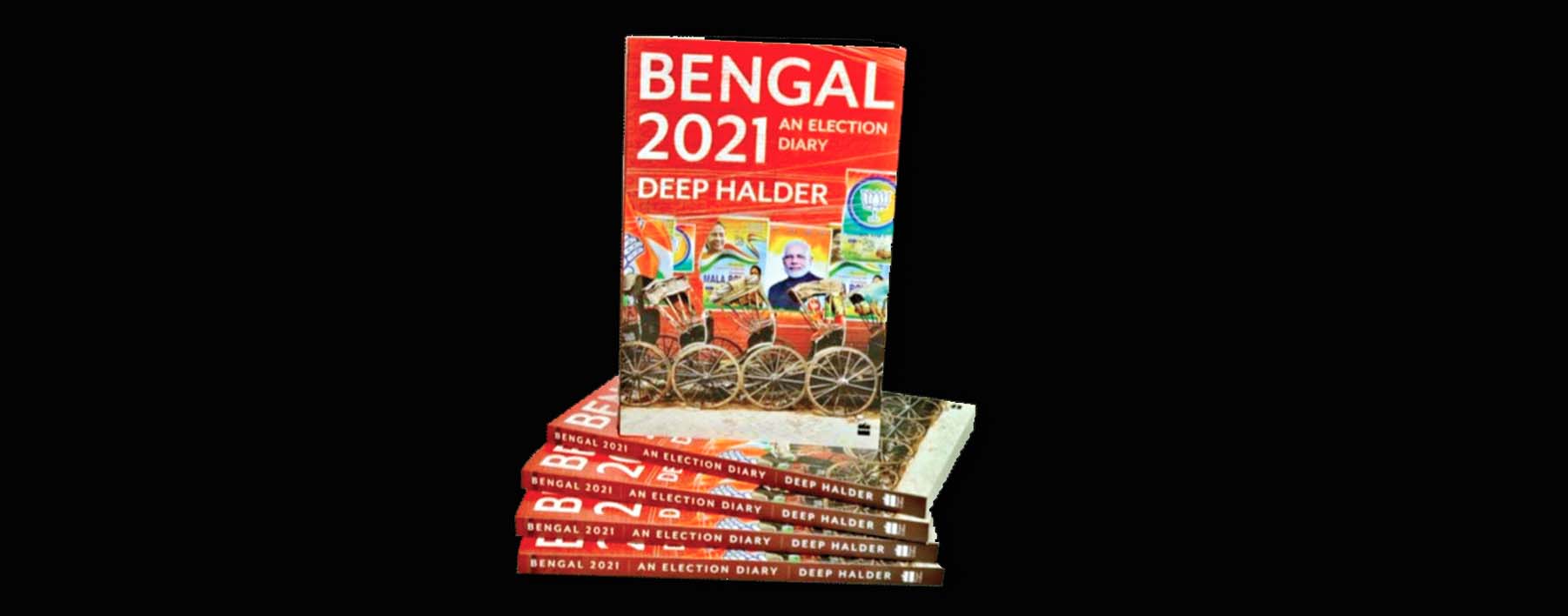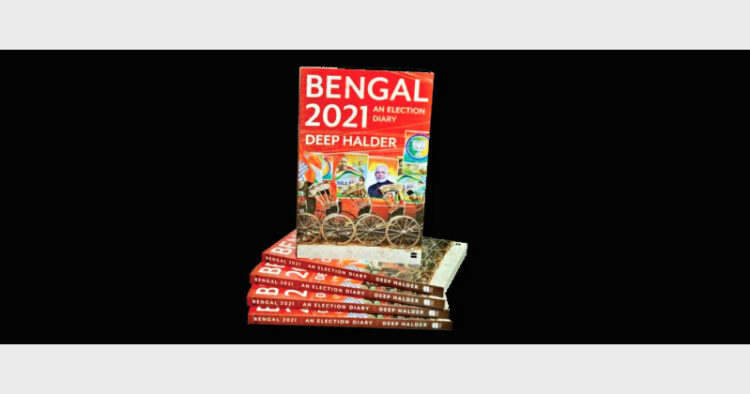Deep Halder’s new book ‘Bengal 2021: An Election Diary’ demolishes multiple myths and presumptions about West Bengal’s politics and society, and sheds light on the rise of Saffron in Bengal. He believes three issues will determine the polls’ outcome this time: Bengali identity, caste and religious identity

Bengal 2021: An Election Diary, Deep Halder,
Harper Collins India, pp 130, Rs 299
Harper Collins India, pp 130, Rs 299
The Assembly election schedule for the 294 seats of the West Bengal Assembly has been announced. Spread over eight phases, the voting is to start from March 27. As the voting date is scheduled getting closer, the campaign is getting more and more shrieker.
In this, what one cannot miss is how the players who have ruled Bengal for more than half a century have been relegated to the sidelines. The party, which won just three seats in the last Assembly election in 2016, has emerged as a strong contender for power.
Not only this, there are some other crucial questions which are bothering the people. What will be the outcome of the polls? What are the factors which will determine the outcome?
Here comes a very timely book ‘Bengal 2021: An Election Diary’ by senior journalist and author of ‘Blood Island: An Oral History of the Marichjhapi Massacre’ Deep Halder.
The author has busted many myths and presumptions about Bengal. In more than three decades of Communist rule, Bengal has become a casteless society. Nothing could be farther from the truth. Caste does exist in Bengal.
In fact, you can feel a caste divide in the most cosmopolitan place in Bengal: Kolkata. The book details how Matuas and Namsudras (Scheduled Caste) have determined the outcome of the polls.
And another myth that has been propagated is that Bengal has witnessed the rise of the Right after the Bharatiya Janata Party (BJP) won 18 of the 42 Lok Sabha seats in the 2019 general election.
On the contrary, it has been the other way around. The Right has existed in the State for decades. More than 2000 shakhas of the Rashtriya Swayamsevak Sangh (RSS) did not come up in a day. Far away from the cameras’ glaring lights, the RSS and its affiliate bodies have been working with the tribals and the marginalised in the hinterland for decades.
Halder believes three issues will determine the polls’ outcome this time: Bengali identity, caste and religious identity. The campaign revolves around these issues.
There is a unique Bengali identity. What will happen to it if the BJP comes to power? The BJP has been trying to quell any such fears describing how it is a party which has always existed in Bengal.
And then comes caste. Although a cursory look will give an impression that more than three decades-long Communist rule has made Bengal a casteless society, the fact is that caste does exist in Bengal.
The BJP has made huge inroads into the Scheduled Caste of society. Of 10 reserved seats of Lok Sabha in Bengal, the BJP won five. Slowly but surely, the Scheduled Castes are asserting their identity.
Bengal has always been synonymous with Bhadralok. But when one goes deeper in the book, one gets to know about the existence of Chotolok. What is Chotolok? Antithesis of Bhadralok.
The very existence of Chotolok is enough to say there exists a deep caste and class divide in Bengal. But, to propagate their narratives, the past governments have suppressed their identities and aspirations.
After three decades of Independence, the Communists captured power in Kolkata. And they ruled the State with an iron fist.
By the end of the first decade of the 21st century, Bengal was yearning for a change. Mamata Banerjee captured that imagination through her slogan, ‘Poriborton’. So, has there been a ‘Poriborton’ in Bengal? Yes. But, it has been for worse, not for good.
This ‘Poriborton’ has been captured brilliantly in the book by an unnamed character who narrates how he has been forced to pay more hafta (protection money) in the last ten years of the Mamata Government.
No discussion on Bengal politics can escape the question of the Muslim appeasement. Many characters in the book have expressed their anger over the politics of appeasement of the ruling Trinamool Congress.
Mamata Banerjee dethroned the Left in May 2011. In the next few months, she announced the government policy of paying Rs 2500 per month for every Imam in West Bengal. There are multiple narratives of characters in the book about how norms are flouted in Muslim dominated areas with impunity and the administration being a silent spectator.
When it comes to law and order, the Mamata Banerjee Government looks like a colossal failure. Public memory is very short. But it would be worth it to remember the Park Street rape case.
Bengal has always been synonymous with Bhadralok. But when one goes deeper in the book, one gets to know about the existence of Chotolok. What is Chotolok? Antithesis of Bhadralok. The very existence of Chotolok is enough to say there exists a deep caste and class divide in Bengal. But, to propagate their narratives, the past governments have suppressed their identities and aspirations
None less than Chief Minister Mamata Banerjee termed the incident fake and an attempt by the vested interests to malign her reputation. Later, the rapists were convicted by the court. But the Chief Minister never bothered to issue an apology.
The author has mentioned one incident in the book where the Chief Minister herself walked into a police station to set free two Trinamool workers who were arrested for arson. The impact of this one incident could be imagined on the law enforcement agencies and personnel in the State.
Except for a few people directly involved in party politics, nobody wants to be quoted in the book. The fear of repercussion is real.
In just 130 pages, this book clears the web in one’s mind about Bengal and this election.
Chief Minister Mamata Banerjee changed her assembly seat from Bhawanipore to Nandigram. It has happened for the first time in her political career. Many of her close confidants have left her. One of her closest, Suvendu Adhikari, is contesting against her in Nandigram. Mukul Roy, number two in the Trinamool Congress till a few years back, is now with the BJP.
And, to top it all, there is a yearning for ‘Poriborton’ again. Is it strong enough to catapult the BJP to power? Wait for May 2.














Comments